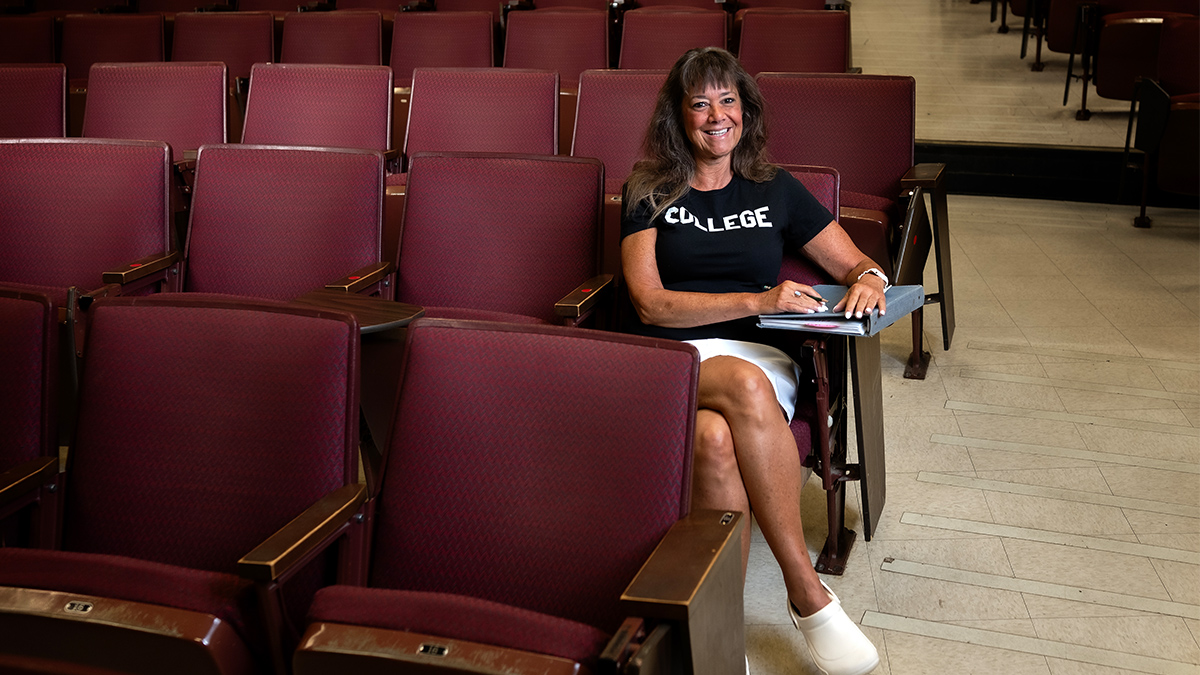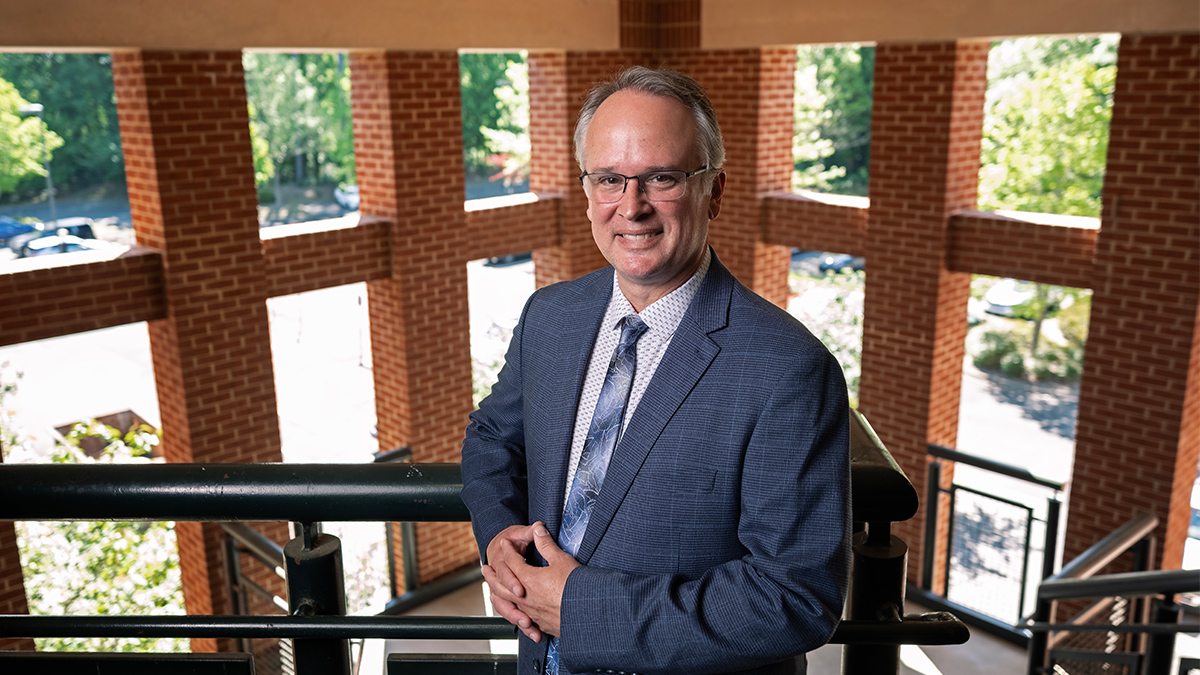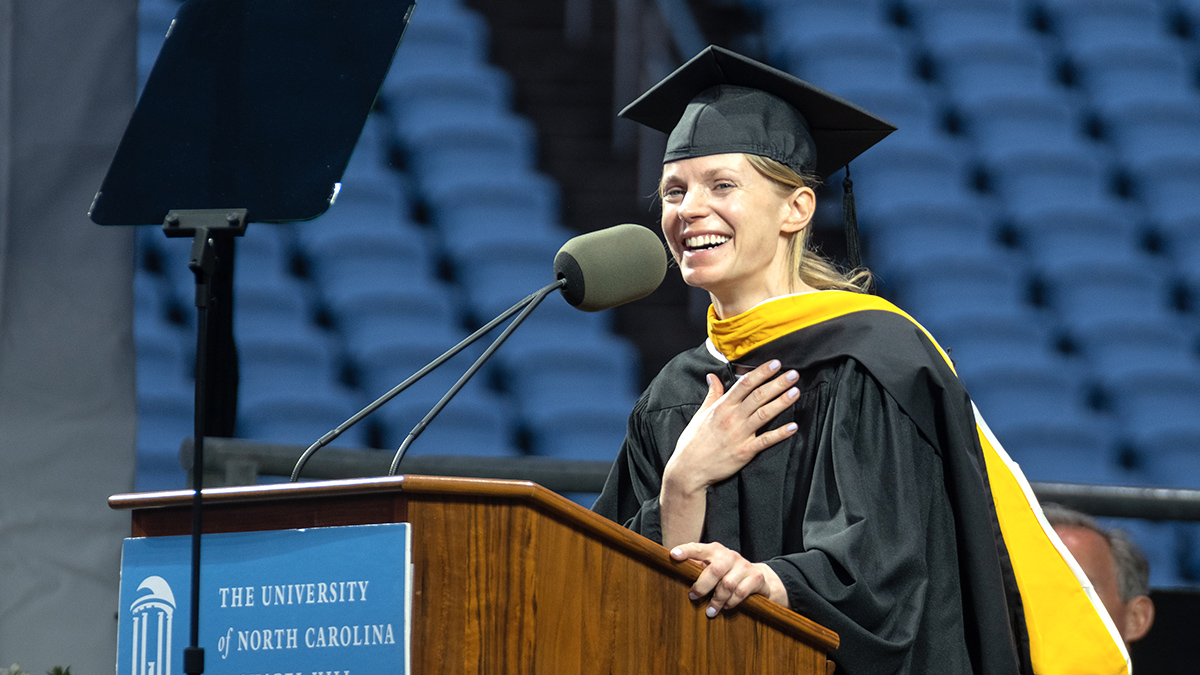Leading through disruption
The omicron variant has not stopped the important mission of the University, says Chancellor Kevin M. Guskiewicz.
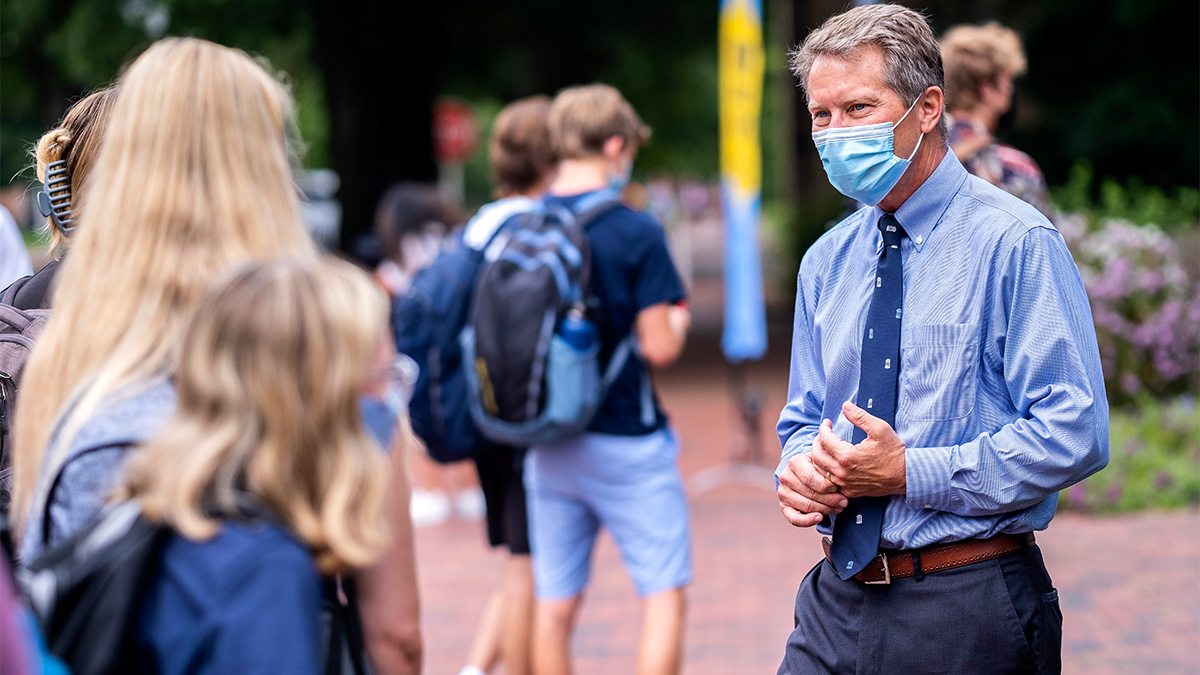
Editor’s note: This is the first of a two-part Q&A. It has been edited for brevity and clarity. Look for the second part on Jan. 20.
After a much-needed winter break, spring semester is underway. Once again, the COVID-19 pandemic dominates the conversation. The Well sat down with Chancellor Kevin M. Guskiewicz to talk about the latest virus variant and much more, including the soon-to-be launched IDEAs in Action curriculum and the School of Data Science and Society.
How was your winter break?
I took the advice that I shared with many people who were tired at the end of the semester, and that was to try to unplug a little bit. It wasn’t without spending a fair amount of time working, but I was able to block that time around some much-needed family time. We got away to the mountains, where the weather was unseasonably warm. We were in Linville and got some great hikes in, did some reading and things that I wouldn’t otherwise have had a chance to do here in Chapel Hill. We played a lot of games — Apples to Apples, card games. We play a lot of spades.
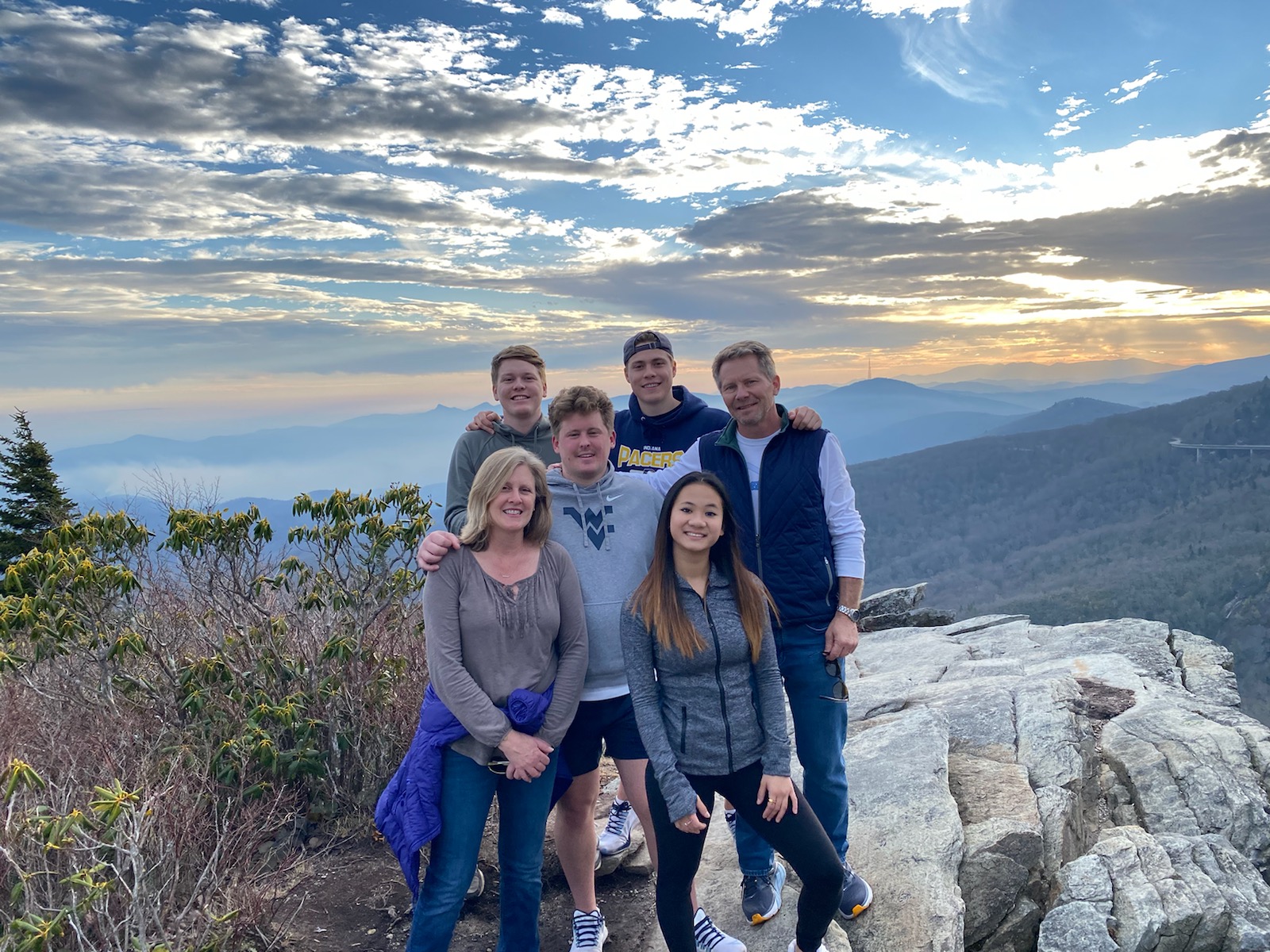
Chancellor Guskiewicz and his wife, Amy, join their four children on a winter holiday hike near Linville, North Carolina. Along with Tessa (front) are Jacob (center), Adam (back left) and Nathan. (Courtesy of the Guskiewicz family)
What were you working on over the break?
We were fine-tuning some things for our upcoming budget discussions, which are going really well. And, of course, I was on a lot of Zoom meetings to discuss the pandemic — making sure we had the best plans with the latest information regarding start of spring semester. During the last two semesters, we successfully navigated around the challenges the pandemic presents. We’ve proven that we can do this, despite some of the curveballs we’ve been thrown.
With each of these variants, parts of our playbook can work, but other parts may not. We’re incredibly fortunate to have infectious disease and public health experts that can help us adapt as needed. We have taken into consideration both the physical and mental health components of this situation as we put a plan in place. We’ve heard from every constituency you can imagine. Those opinions are important, and we’ve listened, and I think we’ve put a plan in place that will work. But as we have said repeatedly, we may need to adapt or adjust our plan.
Things are changing rapidly. It’s a very fluid situation with this new omicron variant. There are and will be many cases on campus. But as we know: Being fully vaccinated, including getting a booster shot, greatly reduces the severity of illness and hospitalizations, and the vaccination rates on campus are incredibly high. [At the time of publication, 94% of students, 94% of faculty and 88% of staff were vaccinated.]
Other than COVID-19, what’s top of mind for you as we begin 2022?
My goal is always to try to best position the University for meeting the goals that we’ve set out in Carolina Next. That roadmap is as important to us today as it was two years ago when we launched it.
One of the most important strategic initiatives is Serve to Benefit Society. When I look at the ways in which we have done that through our mission of teaching, research and service, I’m really proud of what this great University has done and the commitment that our community has shown to stay true to that.
So that’s my primary goal. How are we going to do it? Well, we’re having another incredible year in research funding. We’re probably going to pass last year’s record-breaking, nearly $1.2 billion mark. But as I say often, it’s not just about the dollars. It’s about the impact those dollars make — that our researchers make — in improving society, the contributions to humankind that work delivers every day. We are curing and treating diseases, protecting our planet, strengthening our democracy and much more.
We’re now within six months of launching our new general education curriculum, IDEAs in Action. I’m really excited about that. When I was dean of the College of Arts & Sciences, I worked alongside over 200 faculty, staff and students to develop that curriculum. That was more than three years ago, and in August it’s going to become a reality.
How will IDEAs in Action benefit students?
IDEAs in Action places more emphasis on experiential education and preparing our undergraduate students to approach the world with inquiry and evidence to identify and ultimately solve big problems. This involves teaching students how to ask good questions and identify the right methods to answer those questions. The new curriculum aligns nicely with the mission statement we developed five years ago for the College: Think. Communicate. Collaborate. Create. … for meaningful lives.
One example are the Triple-I: Ideas, Information & Inquiry courses, which bring together three faculty from different disciplines to co-teach on a particular theme or topic. These will open the eyes of our first-year students to possible disciplines and careers that they may have otherwise never imagined. They will be introduced to how they can help to solve some of the big challenges of our time through collaboration and team-based science. They’ll see our faculty in action as they address these big problems.
I think this curriculum is going to better position our students for success in a world where so many people pivot 10 or 15 years out into a different career path, or where they take on a job that didn’t exist 20 years earlier.
What else are you excited about?
The new School of Data Science and Society. It’s going to be unique because it brings together different disciplines in using data and information to solve humanity’s greatest challenges. We will leverage the full range of talent at Carolina and add new resources, faculty and researchers to address these complex social challenges. We will create a larger ecosystem of data-related research and teaching on campus and help deliver the workforce needed for companies across the region and the nation in desperate need of the talent we will produce. It’s not just about crunching numbers. It’s about the applied nature of data science, informing decision-making within society. So many different industries rely on data scientists to help advance their mission.
Do you have a timeline for the School of Data Science and Society?
In March of 2020, our trustees endorsed the launch of the school, but then the pandemic hit, and the resources just weren’t there. We didn’t put it on pause. The working group continued looking at different ways to execute the plan and to launch the school. We’re at a critical juncture now. We’ve identified internal funding, and we’re engaged with the UNC System Office and preparing to ask the General Assembly for additional funding to help make this a reality. Our new provost, who will be in place soon, is as passionate about this as me. He and I are going to work closely with our implementation team and deans, and we will soon name the academic leaders of the new school. Stay tuned.
What else are you focused on this semester?
Two other areas are UNC Global and the downtown economic development initiative.
I’ve made very clear the importance of Carolina becoming the leading global public research university. I’m so proud of the way that we have maintained that as a priority despite the pandemic. I want to continue to place emphasis on that, to continue to raise money so that all students can study abroad. I want to increase our global partnerships for research.
As for downtown economic development, Carolina needs to be the anchor institution for the region, and we’re committed to that. We’re starting to see downtown Chapel Hill come alive with interest in businesses moving to Franklin Street and Rosemary Street because they want to be able to rub elbows, if you will, with our world-class faculty and researchers. We have to have an infrastructure that supports that. What they’re building out is going to allow for the kind of engagement that will encourage more strategic partnerships. It will be a magnet for industries. BioLabs was the first industry partner to say, “We’re in.” Having BioLabs, a premier co-working space for life science startups, was key. This will be a big success and I’m confident it will attract other startups to our evolving innovation district. We hope to launch one new research-based startup from UNC-Chapel Hill each month.
In the second installment of the chancellor’s Q&A, Guskiewicz addresses the provost transition, the recently passed North Carolina state budget, balancing the University’s budget and more. Look for it in Thursday’s From The Well.
